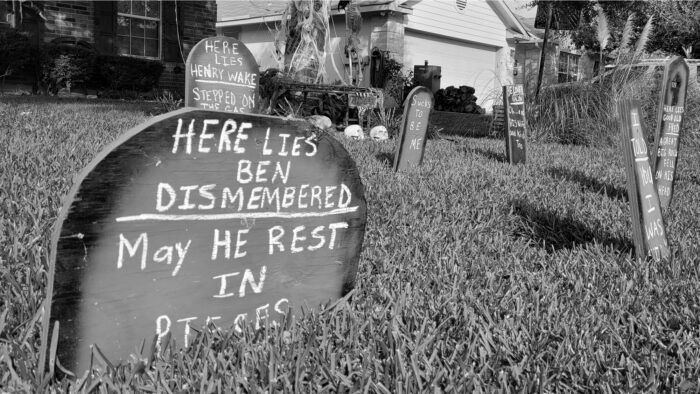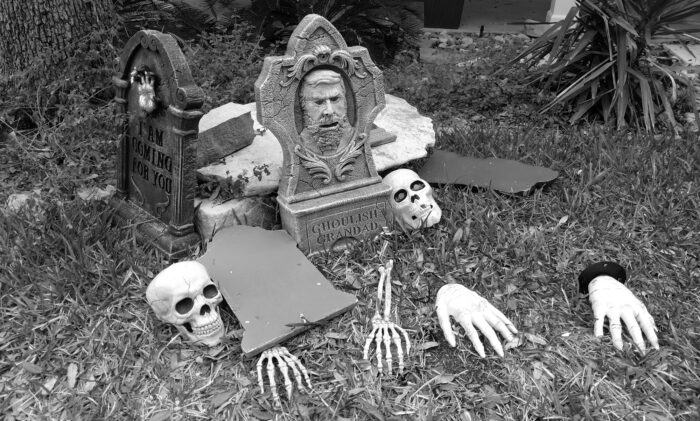Don’t Let Halloween Flippancy Distract You From Real Horrors and Promises
For the first time, I’ve seen death this year. That’s why I cannot laugh about certain Halloween decorations with other people. In fact, I find some of them deathly nasty.
Yes, it’s probably okay for Christians to participate in some Halloween stuff.1. Most kids and grown-ups aren’t trying to worship devils. Instead, they’re feasting and celebrating stories, scary ones and otherwise. It’s not All Hallow’s Eve, but All Fandoms Eve—more like Comic-Con: The Holiday. To be sure, some people may be tempted to indulge in occult activities, and yet most Christians are not.
And yet.
Halloween still makes me nervous.
I can offer three reasons Halloween still bothers me. These three reasons may sound different, but people (or the Devil, or somebody) find ways to do them all.
1. Halloween can make light of death’s darkness.
Yes, we know Christ has set Christians free from bondage to sin and death. We celebrate this freedom as bondservants to Jesus.2 Even as we guard against Satan and his lies, we can laugh at the Devil’s attempts to scare us:
The gospel reveals that much of the fear that Satan excited in men prior to the advent of Christ resulted merely from the exaggerated shadows that he cast in the darkness. Now that light has come the shadows are removed and Satan is reduced to a far less terrifying stature. We can begin to laugh at the shapes that we once saw in the shadows.3
Non-Christians, however, can’t celebrate this freedom because they don’t have the Christian’s freedom. But they often try anyway, including with many Halloween tropes and imaginations. They make decor and movies based on scary creatures—zombies, spiders, wraiths—and images of death, like gravestones and skeletons.

Parody gravestones on a neighborhood lawn in 2021. (photo by E. Stephen Burnett)
Gravestones and skeletons. Always the gravestones and skeletons.
As if the very concept of dying, rotting away, and leaving nothing behind but a grinning set of remains isn’t the worst thing you can imagine.
People ignore that fact. They try to laugh at death.
They try to make light of the darkness.
But non-Christians have no cause to laugh. Death and darkness remain actual fears. Without Jesus, any person will end up as nothing but headstones and skeletons at best. That’s not hilarious. It’s seriously terrifying. If you mock these truths, that’s just as darkly ridiculous as mocking the train that’s speeding at you tied to the tracks.
This is not the laughter of a warrior who’s truly victorious over darkness and death.
It’s more like the Joker laughing before the amusement park explodes in his face.
2. Halloween may mock the resurrection with gross parodies.
While Halloween celebrations make light of serious terrors, these things also end up making light of glorious, beautiful truths, or casting truths as if they are horrors.
Imagine the same decorative emphases on zombies, tombstones, skeletons, and ghosts. All of these symbolize one Halloween trope: The dead come back to life. In every instance, these tropes imply the concept—not in direct thoughts, but in each assumption, “scent,” and feeling—that coming back from death is a terrible thing. If you return, you’ll only be a skeleton. A zombie. You’ll not be alive, but “undead.”
In one sense, this is a very real terror. If by some mystical or mad-scientific means you did return from the dead, that would be terrifying. Even worse, imagine if your body had decomposed, reducing you to an animated skeleton or shambling corpse.
Isn’t this a gross inversion of our celebration at the holiday opposite Halloween: Resurrection Sunday? We mark Halloween in the autumn, just before much of the world enters a season of decay leading to death. But on Resurrection Sunday in the spring, we herald the season of new life and celebrate the bodily resurrection of Jesus Christ. He did not merely become “undead.” He defeated death itself and was raised to life, the same Person as before, immortal and ready to reign forever.
In response to this truth, non-Christians mock the idea of resurrection. They often use Halloween imagery. “Ha ha! Zombie Jesus.” They assume notions from horror tropes: that if you come back from the dead, that is terrible, dark, evil, perverted.
They miss the beautiful truth of resurrection and see only a frightful freak.
They ignore the promise of new Spirit-powered bodies,4 pulsing with divine light, and see only shambling corpses with rotting flesh.
Halloween decorations flippant-ize even the initialed subtle promise of resurrection on gravesites. Instead of Rest in peace, we see the scary letters RIP, like the verb rip. Three of the most hopeful words in our language have become a threat of violence.
3. Halloween might distract us from confronting real horrors.
As of this article’s date, many communities are still confronting COVID-19 pandemic restrictions. Debate the plague’s seriousness all you like, but surely we agree we’ve faced some kind of threat, past or present. No one wants a world in which a virus can kill hundreds of thousands of people. Yet here we are. Horror stories are real, and they surrounding us every day. Many of us have lost family or friends.
Do Halloween décor with all their supposed scariness dare to confront this reality?
When did you last drive past that house in your neighborhood, the one whose residents always Go All Out, and see any pandemic-related horror displays?
Skeletons with coronavirus?
Vaccinated zombie mutants?
Monstrous-looking nurses or politicians or conspiracy-driven civilians?
In our real world, people are constantly warning about these terrifying threats. Yet two Halloweens after COVID-19 began spreading, we’ve kept these creepy tales in the headlines. They haven’t made their way to lawns and themed parties.
These leads me to two possible conclusions: (1) that most people don’t actually believe any of these things are that scary, (2) they’re actually so terrifying, people dare not confront them at the creative level, much less try to laugh about them. Skeletons and vampires and ghosts, well, those are “safe” scary stuff to adorn your front yard. But a sickly skeleton hooked to a ventilator? That’s beyond the pale.
If you celebrate at Halloween, keep challenging the tropes.
No, I don’t want to cancel Halloween or distribute scary illustrated tracts about it.
Each year, we leave on the porch light. We hand candy to trick-or-treaters.
Yes, we know legalism is bad (including when people legalistically fear the legalism). Yes, the apostle Paul emphasizes Christ-exalting freedom when he talks about Old Testament holidays, anyway. Horror and scary creatures are not automatically evil, and plenty of horror tales illustrate evil and hint at gospel redemption.
Unlike our non-Christian friends, we can boast in Christ’s light, laughing at the darkness, even as we take darkness seriously as we work to disciple his people.
And yet.
I’ve begun to correct for the overcorrection, openly challenging our ingrained habit to try making light of darkness. I question whether we ignore resurrection hope and focus on dark parodies of resurrection, such as zombies and animate skeletons. And I insist we confront real horror in our world, rather than silly cartoon “realism.”
We need to ask these questions of any holiday we observe, challenging ourselves about why we decorate and feast and enjoy traditions.
In this case, we might ask, “Can I decorate my yard with this plastic RIP tombstone ironically? Or does some part of me suspect resurrection would be terrible?” Or we might ask, “Am I making light of death and horror because I’m strong in Christ and know that death has no ultimate power over me? Or am I trying to laugh away the real ghouls of evil that I suspect are still lurking out there, ready to attack me?”
Don’t feast and celebrate at Halloween with any forced laughter at undefeated death. Don’t give any ground to suspect Christ’s beautiful, miraculous Resurrection promise. And don’t cover over real horrors with cheesy, grinning imposter plastic.
Instead let’s recall some of Halloween’s origins. Let’s celebrate, not death, but saints who will return to life—not undead ghouls, but risen, glorified family and friends.
Make your Halloween serve biblical truths of light, resurrection, and godly realism.
- This article’s original version was published at Speculative Faith on Nov. 2, 2017. My views and style have changed a bit since then, so I’ve revised and updated the article. ↩
- See 1 Corinthians 7:22. Jesus did not set us free for “freedom’s sake,” because he loves us too much for that. Instead he sets us free for his sake, and we live in joyous service to him. ↩
- Of Boggarts, Alistair Adversaria, July 24, 2007. Quoted in “Casting The ‘Riddikulus’ Spell On Halloween,” E. Stephen Burnett at Speculative Faith, Oct. 27, 2010. ↩
- See 1 Corinthians 15. In verses 44—45, the apostle Paul says our new bodies will be “spiritual,” unlike our old bodies that were “natural.” Paul is not saying our new bodies will be ghost-like or non-material. He means our new bodies will be empowered by the Holy Spirit. ↩






























I think you need to watch some Ask a Mortician on Youtube. She talks a lot about how death has been medicalized, since vanishingly few people have cared for a family member’s corpse and are being directed to deal with their grief by buying expensive and unnecessary crap. A corpse don’t need a mattress, but it’s easy to see how emotionally compromised people will buy one because they still see their mom in that stiffened meat bag.
I think I want my future corpse laundered in lye (aqua-mation) for easy and relatively eco-friendly disposal.
This was the one I was thinking of (don’t worry, Goth Ms Frizzle has a good sense of humor):
also too:
Pretty awesome view of these matters! I’m surprised how extensively I hold thesame views of things. I do want to say 2 minor, to me, things:
-What about all of those “corona parties”, especially near the beginning?
-I’d prefer to call out real death with the wide array of real-life causes. Speaking of being actually real; no condescension or other offense is intended when I say: I think covid’s only on a level with the violence and death-by-some of the other means around the world. Like famine, even where assisted by anti-covid measures, whether anyone says “necessary” or “unnecessary”, as well as ubiquitous having harmful weather SOMEWHERE in the world every single year.
And wars/fighting – including theun popular and less-covered fighting. Like in Venezuala, as 1 among many. Inflation also made life difficult there.
And the already familiar, almost “boring” to some people, diseases (okay; some less so than others), drug overdoses, HIV in Africa + elsewhere, homelessness (like, say, weather exposure), car accidents, work-related accidents… others. Wild animals in rural communities, while venturing into wilderness, or creeping into bigger towns/cities; recreation (say, avalanches or wild plants or cuts & falling) emergencies, deaths, & near-misses; and, finally (that I’ll mention; you know not the only causes) real-life people creepily or scarily abusing & misusing others. Including young kids.